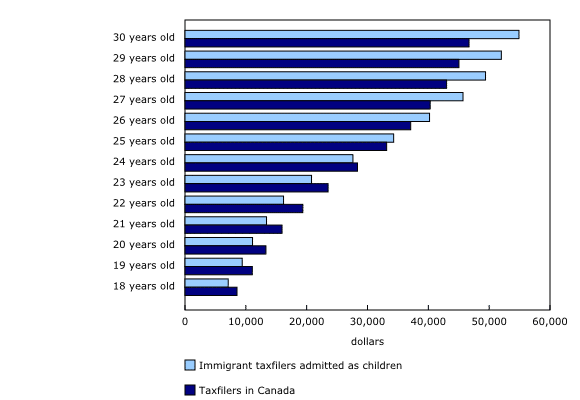Study: Immigrants admitted to Canada as children have better education and work outcomes
A recent study by Statistics Canada has found that newcomers who settled in the country as children are more likely to pursue higher education—and to have better economic outcomes.
In fact, this group of newcomers reported higher earnings than all other Canadian tax filers by the age of 25.
Discover if You Are Eligible for Canadian Immigration
The earlier the better
Looking at data available through the Longitudinal Immigrant Database—a huge data model that tracks long-term data on immigrants who arrive in Canada—researchers found a positive correlation between how soon a newcomer was admitted to Canada, and their likelihood of pursuing post-secondary education.
For example, among immigrants who initially settled in Canada at the age of 4, 77.3% participated in post-secondary education by the age of 20. This finding was consistent with those who settled in Canada between ages 5-9—69.9% of whom participated in post-secondary education; and those who settled in Canada between ages 10-14 (61.3% of whom participated in post-secondary education).
By comparison, only 59.9% of all Canadian tax filers participated in post-secondary education by the age of 20—showing that newcomers cohorts had a significantly elevated rate of participation in post-secondary education, even when compared to all Canadians.
This finding was paralleled by the economic outcomes of newcomers based on how young they were admitted to Canada. Specifically, newcomer tax filers who were admitted to Canada reported higher earnings than the average of all Canadian tax filers in their age group.
Interestingly, however, this finding was not immediate but delayed based on the age of the tax filers. For instance, immigrants who were admitted to Canada as children had slightly lower median wages than all other Canadian tax filers between the ages of 18-24. However, after the age of 25, the median wages of this newcomer cohort equaled or surpassed the median wage of all Canadian tax filers in the same age bracket.
By the age of 30, newcomers admitted to Canada as children had a median wage that was 17.6% higher than that of all other Canadian tax filers in the same age bracket. These findings are detailed in the graph below.

What do these results indicate?
Results from this study seem to indicate that both participation in higher education, and labour market outcomes are positively impacted for newcomers who arrive in Canada at an early age—with an increased effect for those who arrive in Canada earlier. The study further suggests that newcomers who are admitted to Canada earlier have better outcomes than not just those who arrive later in the country, but also the Canadian population in general. The study does not suggest reasons for this phenomenon, with more research needed to explain how these results come about.
This data adds to further literature that suggests a positive correlation between the youth of immigrants at the time of admission to Canada, and successful economic outcomes in the country—in the short, medium, and long-term.
Interestingly, other studies have also suggested that the positive relationship between how soon an immigrant arrives in Canada and their earnings increases with time. This is also reflected in the scoring weightage that the Comprehensive Ranking System (CRS) gives to age, with younger newcomers seeing an advantage due to their youth.
- Do you need Canadian immigration assistance? Contact the Contact Cohen Immigration Law firm by completing our form
- Send us your feedback or your non-legal assistance questions by emailing us at media@canadavisa.com







